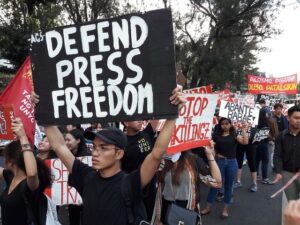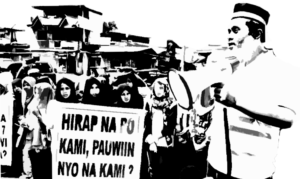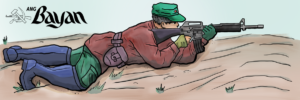To a veteran of the anti-dictatorship struggle, the fight goes on

Comrade Delio is closely watching the 2022 elections and the candidacy of Ferdinand Marcos Jr, son of the dictator. He is gratified by the momentum of the opposition which has not backed down despite the monstrous machinery of disinformation of the dictator’s family to revise history and return to Malacañang.
Ka Delio is more than 70 years old. He has a wife and child, and a grandchild as well. He is among the veterans of the New People’s Army (NPA) who lived through the Marcos dictatorship and the successive reactionary regimes.
Many among his contemporaries have been martyred or have retired. Retired or not, the fighting spirit remains active in people like Ka Delio who until now are fighting for the Filipino people’s aspiration for a free, democratic and progressive society.
Based on his experience, the armed democratic revolution is not a straight path.
In the 1960s he became part of the student movement for reform as a member of a social democratic group influenced by clerico fascists. When the First Quarter Storm of 1970 erupted, he sought to link up with the national democratic movement.
He first joined the Samahan ng Demokratikong Kabataan (Association of Democratic Youth) and later the Kabataang Makabayan (Patriotic Youth) when Marcos suspended the writ of habeas corpus in 1971.
He became more convinced to join the revolutionary movement when he read Prof. Jose Maria Sison’s book Struggle for National Democracy. It was given to him by a former classmate from a Manila university.
He and other fellow activists were in the stage of planning to conduct social investigation to open a guerrilla front in the Visayas when martial law was declared. Although they had no military experience like the “Tarlac-trained” or “Isabela-trained” cadres, they were forced to move to the countryside to start armed struggle. Their only guide was Chairman Mao’s words: We are like seeds that emerge, take root and grow wherever we are blown to.
Ka Delio was tasked by the Party to open a guerrilla zone in the latter part of October 1972, a few weeks after martial law was imposed. People were terrorized by martial law and surrendered almost all their weapons which they use to defend themselves against thieves and bandits. Still, not all were intimidated by the psywar tactic of the Marcos dictatorship. There were a few undaunted ones who did not surrender their arms. They gave their weapons to Ka Delio’s group as seed for the emerging armed revolution.
The people’s army in this part of the Visayas started with two handmade revolvers. A .45 caliber pistol and four grenades were added later. From zero experience, the “barefoot soldiers” as they learned to launch a war from their waging war.
From a single village, Ka Delio and his group expanded. But the enemy immediately detected their presence and launched the first “nip-in-the-bud” military operation against a small and very weak NPA unit. One night in March 1973, Philippine Constabulary troops raided a hut where fighters were sleeping. They also raided the house of Ka Ponso, a peasant and partime fighter.
They failed to crush even this small NPA unit. In desperation, the enemy abducted Ka Ponso’s 4-year old son to force him to surrender. The soldiers kept the child hostage for a year.
At the most basic, there is no fundamental difference in facing the enemy then and now, according to Ka Delio. From the strategic point of view, they are paper tigers. But in the tactical view, they really devour people. They are soldiers of the ruling classes paid to kill the oppressed and exploited classes who are determined to rise and fight for their rights and welfare.
What is the secret to Ka Delio’s long life? None other but the masses and the masses alone. When the masses are roused and organized, the enemy, despite their numbers, are like searching for a needle in the haystack. Ka Delio remains active and secure from the enemy because of the cooperation of the masses and comrades.




